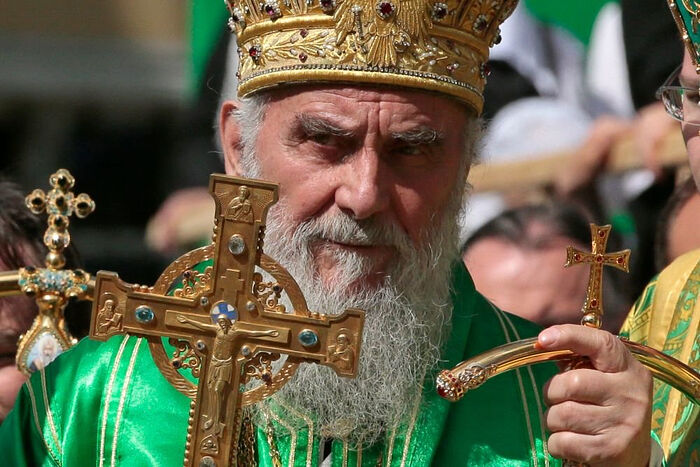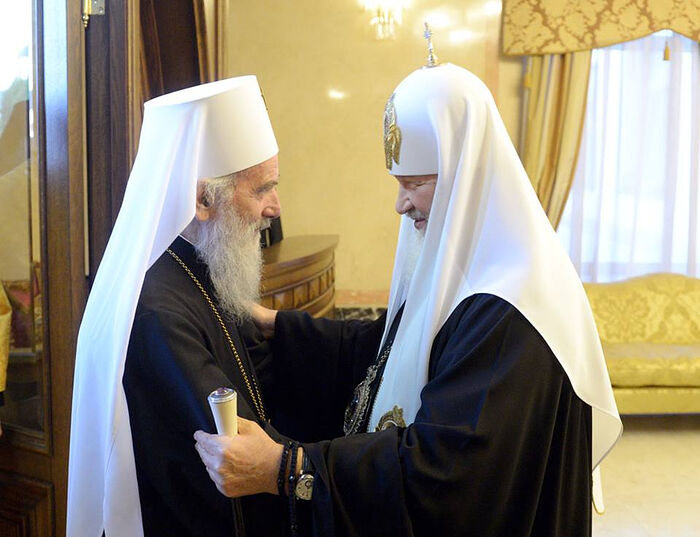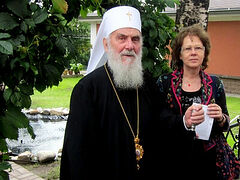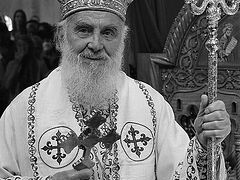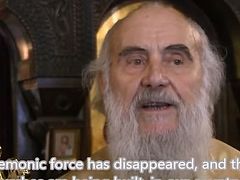The Orthodox Church recently bid farewell to the primate of the Local Serbian Church—His Holiness Patriarch Irinej. He was a first hierarch for whom all are equal before the face of the Lord, all are children of God, and all labor for the good of the Church.
Author and translator Svetlana Luganskaya remembers Patriarch Irinej and her communications with him.
We Are All the Church
—Your Holiness, Serbia has warm, close relations between the clergy and the people, as an example for many, and we would like to ask you how you feel about these relations. What causes you to rejoice, what causes you to worry, and are there any temptations?
—You know, this is normal. The Church isn’t just the bishops, it’s not just the priests. The Church is the people. It’s only in communion with the people that we make up the Church. The Church is one body, a spiritual body, the Body of the Church, and, for relations to be spiritual, sincere, intimate, parental, brotherly, we have to be way this way before God. The people should know and sense that an atmosphere of spiritual harmony and spiritual relationships reign in the Church, so we would ask not “Who is greater?”, “Who is more important?”, but who can do more for the development of the Church with his own personal development in the spiritual life. The clergy and the people are our co-laborers. The priests are the most direct co-laborers with the people, and the people are the spiritual field where the seed—the word of God—is sown. There should be harmony in this.
—Your Holiness, please tell us about any important encounters you had that left a special impression on you or perhaps influenced you as a person.
—Every encounter, every contact with people brings something new, something special, but it seems to me my most vivid memories come from my encounters with simple people, with people who are full of faith and the Holy Spirit—you can hear something from such ordinary people that you won’t hear from intellectuals and educated people. This is the action of the grace of God, Who speaks with their mouths and through them. Educated people are distinguished by their style and way of thinking, their way of expressing their views. Of course, every person is unique and has the right to be unique; this is obvious, clear, and good. But I emphasize that I can’t forget my meetings with ordinary, simple people, for the wisdom of God is expressed and revealed to me through them.
Kosovo—the Serbian Jerusalem
—Your Holiness, you consider the problem of Kosovo and Metohija to be our common responsibility. What can we do to preserve the holy places and the people and make life easier for them?
—Unfortunately, the question and problem of Kosovo and Metohija is quite serious for Serbia and the Serbian people. What Jerusalem is for the Jewish people, as well as for Christians, so Kosovo and Metohija is for us, where there are 1,500 monasteries and churches. Our most important monasteries, which have played a huge historical role, are located in Kosovo and Metohija. This is not to mention what the Serbian people gave and did for Kosovo, on Kosovo field, from the Battle of Kosovo in 1389. How much blood was shed, how much the people suffered to protect Kosovo and Metohija, especially since the time of the Turkish invasion. And how many migrations have there been—not only in 1699 and 1897. There were four or five huge migrations, and the suffering there has continued for centuries. The people have struggled with all these misfortunes.
And the Albanian propaganda in 1878? Then the Albanians—once called Arnauti—planned to annex Kosovo to Albania, and they’ve been developing this plan, this program, ever since. Serbs have been suffering more and more since then, fleeing Kosovo and Metohija, and up to the present day, until the Second World War, when there was another huge migration: 200,000 Serbs were driven from Kosovo. Unfortunately, when they liberated Yugoslavia, Serbia, so to speak, under the influence of the Comintern,1 the communists forbade the people to return, so only a small remainder of the people were left to fight for life in these very difficult conditions, lacking the most important thing for a man—freedom and the right to life.
The state of things is very difficult. Serbia is trying to do something now. Apparently, there are and have been mistakes in the policy of the authorities of both Serbia and Yugoslavia. After the war, the borders with Albania were opened and a mass of Albanians poured out of their country, under the pretext that they were refugees. In fact, it was a plan to seize Kosovo. The more they settled the region, the more Serbs were forced to flee, under pressure. The situation is very, very difficult. We are fighting to survive in Kosovo and Metohija, but the people live in unbearable conditions. We’ll see how this will all end. We were taken by surprise by our recent friends Europe and America, who, without delving into the problematics of Kosovo and Metohija sided with the Albanians, and are working hard in their favor. It’s difficult to understand. We hope in Russia and the states that are friendly to us—China, India, and so on. Unfortunately, Europe and America are on the other side, and they don’t want to see the suffering, the lack of freedom, and the lack of basic conditions for the most ordinary life and human dignity.
What did God give Russia?
—Your Holiness, you visited Russia recently. Could you share your impressions?
—My first time in Russia was at the funeral of Patriarch Pimen, more than twenty years ago.
Russia then and Russia now are two different Russias. They’re completely different from one another. This time I was in Russian longer, about fifteen days, and I had the chance to see a lot. I admire what Russia has done for itself over the past twenty years. The Lord has given Russia great material blessings; He gave it the Russian soul! I was so inspired by the beauty of the restored Russian monasteries and churches with their golden domes! How inspired I was by the people who carry God in their souls, who can wait in line for hours to kiss the cross of the holy Apostle Andrew and other sacred treasures, and who fill their churches.
God gave Russia two outstanding personalities: its Patriarch and its president. Together, they work for the good of their people and their Church. I was especially inspired by the words of President Vladimir Putin when he said, “I don’t know much about faith, but my teacher and adviser is the Patriarch. I learn from him.” The symphony of Church and state is necessary for every nation, and it seems to me it has been achieved to a large extent in Russia. Of course, there are many problems, but they are resolved in the best way possible.
The wishes of the Patriarch
—Your Holiness, what does a typical working day look like for the Serbian Patriarch?
—Just like today: We started at 8:30. We receive guests nearly every day. Above all are the Divine services at the Patriarchate, in the Archdiocese. I have two stavropegial monasteries—the Peć Patriarchate in Kosovo and Metohija and St. Sava’s in America, in Chicago. There’s a lot of work, receiving diplomats, politicians, and so on. We try not to harm the Church in any way—that’s the main thing—as far as it is within our power, and to solve all the problems in the spirit of Tradition and of course, in cooperation with the bishops and clergy. It’s only by working together that we can expect any fruit.
—Your Holiness, what would you wish us, the faithful in Russia, Serbia, and beyond?
—What I can wish for as Patriarch—first of all, to preserve the faith. And not just to preserve it, not just to talk about it, but to live according to faith. That’s how we can show the value and essence of the faith—by living it. And I wish for what we so need now—the unity of Orthodoxy. Unfortunately, the problems that exist in the world have not passed us by, and we have schisms in the Church, both here in Serbia and to some degree in Russia, as well as in other countries; so we need unity. Its absence is also one of the consequences of the weakening of the faith. Thus, the most important thing in our time is unity.
Biographical info
His Holiness Irinej, Patriarch of Serbia, Archbishop of Peć, Metropolitan of Belgrade-Karlovac, was born on August 28, 1930 in the village of Vidova near the city of Čačak. He received his elementary education in his native village, graduated from high school in Čačak, and then continued his studies at the seminary in Prizren and the faculty of theology at the University of Belgrade.
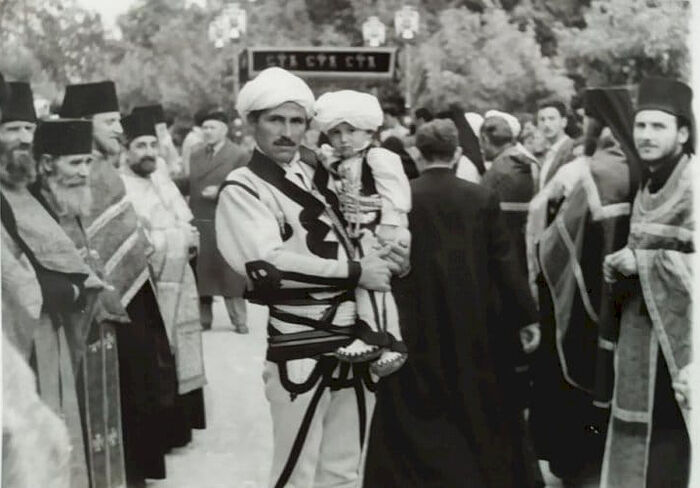 The young Hieromonk Irinej (right) at the enthronement of Patriarch German at the Peć Patriarchate
The young Hieromonk Irinej (right) at the enthronement of Patriarch German at the Peć Patriarchate
After graduating from college he served in the army, after which he was appointed to teach at the Prizren Seminary. Before taking up his position, he was tonsured as a monk in October 1959 by His Holiness Patriarch German of Serbia at Rakovica Monastery with the name Irinej. On the feast of St. Paraskeva of Serbia, on October 27 of the same year, he was ordained a hieromonk in the Ružica Church at Kalemegdan.
He continued his post-graduate studies at the theological faculty at the University of Athens. In 1969, he was appointed head of the monastic school of Ostrog Monastery, then as rector of Prizren Seminary.
In 1974, he was elected Bishop of Moravica, vicar of His Holiness the Patriarch of Serbia, and took up his cathedra on July 14, 1974. In 1975, he became the Bishop of Niš.
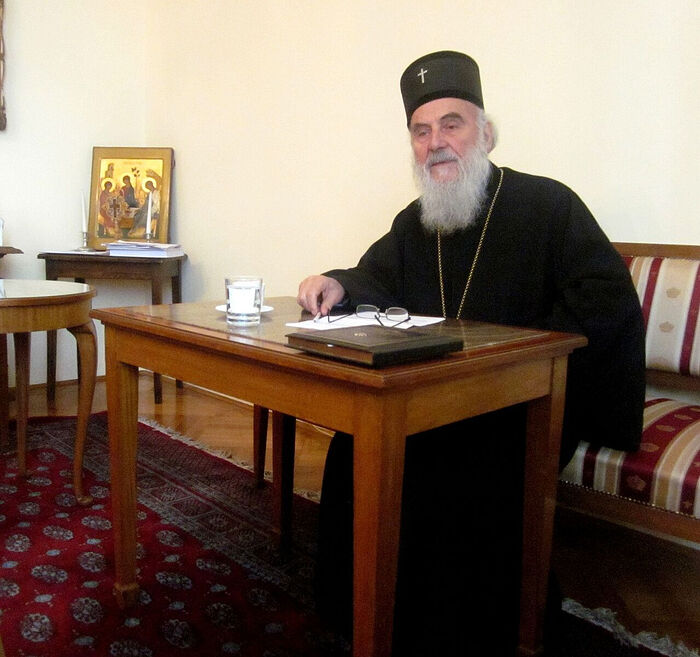 Patriarch Irinej. Photo: Svetlana Luganskaya
Patriarch Irinej. Photo: Svetlana Luganskaya
On January 22, 2010, at the session of the Council of Bishops in Belgrade, in accordance with the procedure provided for by the charter of the Serbian Orthodox Church, he was elected to the Serbian Patriarchal throne.
The next day, the first enthronement of the forty-fifth Patriarch of Serbia, Irinej, was held in the Belgrade Cathedral of the Holy Archangels.
The official enthronement ceremony was held on October 3, 2010 at the Peć Patriarchate in Kosovo.

